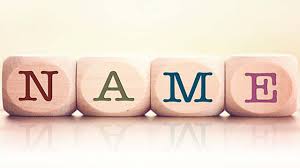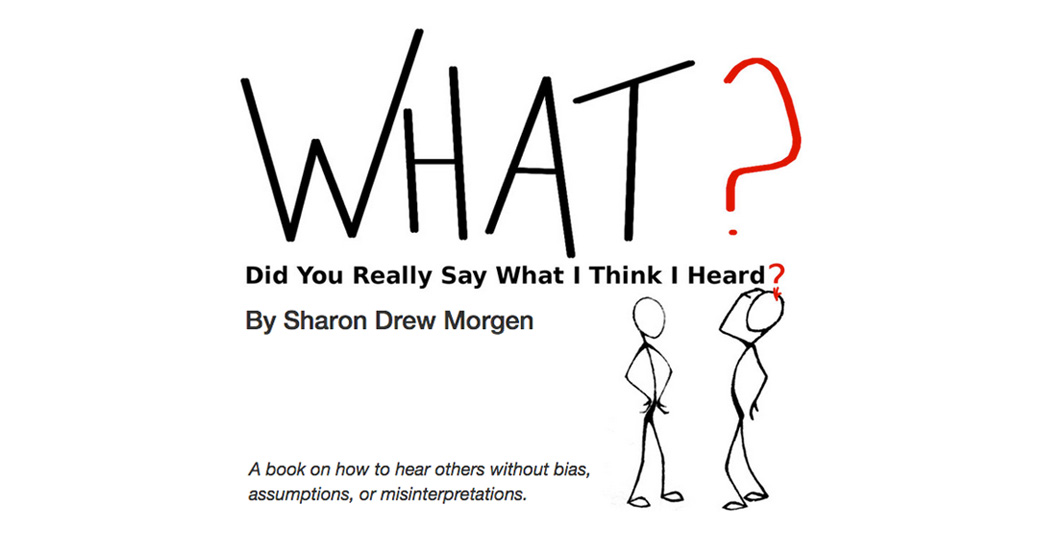What’s in a Name? The tale of Speaker vs Listener
 I often get wonderful ideas during my daily walk. Today I was musing on the implications of Speakers as the arbiters of understanding between Communication Partners. And then I came upon what I think may be an exception. My first name.
I often get wonderful ideas during my daily walk. Today I was musing on the implications of Speakers as the arbiters of understanding between Communication Partners. And then I came upon what I think may be an exception. My first name.
Because brains have a hard time accurately interpreting content different from what’s familiar, people generally don’t ‘hear’ my name accurately. But it shouldn’t be THAT difficult. We’re comfortable with Mary Ann. But not, apparently, with Sharon-Drew.
In this article I’ll discuss how incoming words get translated by our brains, but first I’ll give you a few examples of my daily tribulations. And make no mistake: it’s quite obvious to me that since I’m the one responsible for being understood, I’m the one failing. I just don’t know how to do it better.
NOPE. NOT SHARON
I’ll begin by sharing how I introduce myself (If you can think of a better way to say this, PLEASE let me know!) and how a typical introductory conversation goes:
SD: Hi. I’m Sharon-Drew. That’s my first name. Sharon-Drew. Both words. Like Nancy Drew but Sharon-Drew. Both words. Together. Sharon-Drew. It’s my whole first name. What’s your name?
Hi Sharon. I’m Betty.
SD: No, actually it’s Sharon-Drew, Betty. My first name is Sharon-Drew. I use both words. Not Sharon please.
Right. Got it. Hi Sharon.
SD: No. There are 2 words in my first name. Sharon-Drew. And I always use them both and never shorten it.
Then what’s your last name?
SD: Morgen.
I thought it was Drew-Morgen.
SD: Nope. First name Sharon-Drew, last name Morgen.
Huh. So your first name is Sharon-Drew? Gosh, I’ll need to remember that.
This happens, or some semblance of it, about 25 times a week, year in, year out, everywhere in the States. In Europe and Asia, and in my neighborhood where 5 people have double-barreled first names, there’s no problem so I know it’s possible. But the rest of the time, 100% of every person, every day, refers to me (the first time) as Sharon. Here are more stories:
SD: Hi. I’m Sharon-Drew. That’s my first name. Sharon-Drew. Both words. Like Nancy Drew but Sharon-Drew. It’s my whole first name. What’s your name?
Hi Sharon. I’m…
SD: No, actually my first name is Sharon-Drew. Both words together. Please don’t refer to me as Sharon. I don’t like it.
If you don’t like Sharon, then what’s your name?
SD: Sharon-Drew. Two words. Last name Morgen. Sharon-Drew, first name. Then Morgen second name.
Wait, you want them together? Can’t I just call you Sharon? Or Drew?
I could go on: The time at a party when I introduced myself to 5 people in a circle and they each called me Sharon – including the 5th person who’d heard 4 previous name interactions. The time the bureaucrat changed my form so Drew would be under M.I. (middle initial) and I had to show her my license to prove Sharon-Drew was my legal first name and I actually don’t have a M.I. Or the editor that labeled my picture Sharon Morgan (double insult. Last name morgEn) and refused to correct it (“I didn’t get the name wrong. You must have sent it to me wrong.”). It stops being funny after a while.
Of course most people – maybe 70% – remember it after the first time we have this interaction. (My god, who could forget it by then!) Only once did it go on for so long I ended a budding business partnership because the man refused, refused, to call me by my name. Here was our final conversation
SD: I am going to have to walk away from our work together. I can’t figure out how to tell you my name in a way you’ll understand although I’ve tried and failed 9 times (for real). And you can’t figure out that my first name is Sharon-Drew no matter what I say. I don’t see a way forward for us.
R: I still don’t get it. You’re ending because I call you by your name? But I guess you’re right. We just can’t communicate.
Really. Sounds funny in these hilarious stories, but while it’s happening, not so much. And to make matters MUCH worse, my daily defeat is causing me to question my own ability as a Speaker to take responsibility for an interaction. And I’ve written a book extolling this for goodness sakes!
HOW BRAINS TRANSLATE INCOMING CONTENT
The reason people can’t ‘hear’ my name is a great example of how incoming words get (mis)understood by Listeners. It’s actually a brain circuit thing and has nothing at all to do with words or intended meaning.
All incoming words enter our brains as mere sound vibrations – puffs of air with no meaning – that go through several chemical/electrical processes and get dispatched to a circuit of historic and ‘similar-enough’ (A neuroscience phrase! Similar-enough to what??) signals that translate them into what we think we hear.
We’re left thinking we’ve heard accurately, but sometimes it’s nowhere near reality. So when folks don’t ‘get’ my name, they just don’t have the brain circuitry translate an unusual double-barreled name and it’s not their fault.
From my own writing and research, I know it’s my responsibility to use words in a way they’ll be translated accurately. But frankly, even after developing mind-brain models for decades, I still have trouble getting my name understood. Sometimes, when I say ‘two words, together’ or ‘I know it’s odd but…’ folks can add a codicil to their current circuitry. But when people have NO circuits to translate, I fail.
MIND-BRAIN HACKS
That brings up a question: Since we can’t control how our brains translate incoming content, and our listening/understanding capability is restricted by our history, the mental models, experience, and beliefs that shape our Identity, can we have choice?
As Speakers we can help enable accurate comprehension by saying things in several ways, using different metaphors, different words, different tones. Or begin with a summary statement, asking if anything like that is familiar… like, “I’d love to discuss the way we communicated last night. Do you remember any of our history of those sorts of conversations?”
We can also check if what we think we’ve heard is accurate. Ask our Communication Partner:
“I’d like to tell you what I think I heard you say. Can you please check that it’s accurate and correct me if I missed something?”
One of my favorite mind hacks is listening in Observer; meta listening that captures the essence, the metamessage, of what’s being said rather than the exact details. Remember when your small children used crayons on the new wallpaper and you needed a deep breath to remind them to use their pads instead of the wall? Or that time your partner forgot your birthday and you decided to have patience? You were in Observer. Observer offers choice.
As a meta position, Observer enables you to go beyond your standard listening, avoid standard reactions, and enable your brain to do an expanded search. You’re metaphorically going up to the ceiling looking down at the situation with a broader, much-less subjective viewing range, less emotion, and more conscious choice.
When coaching and communicating with clients, in negotiations, or gathering data, I remain in Observer to make sure I listen with as little bias as possible. I have a whole chapter on this in my book on closing the gap between what’s said and what’s heard (WHAT?). It’s a nifty tool to expand choice and minimize bias.
But as with my name, I suppose there are just those times when nothing works. So long as we don’t blame the Listener, it’s our own responsibility as Speakers to be understood and acknowledge we all live in restricting brains.
____________________________
Sharon-Drew Morgen is a breakthrough innovator and original thinker, having developed new paradigms in sales (inventor Buying Facilitation®, listening/communication (What? Did you really say what I think I heard?), change management (The How of Change™), coaching, and leadership. She is the author of several books, including the NYTimes Business Bestseller Selling with Integrity and Dirty Little Secrets: why buyers can’t buy and sellers can’t sell). Sharon-Drew coaches and consults with companies seeking out of the box remedies for congruent, servant-leader-based change in leadership, healthcare, and sales. Her award-winning blog carries original articles with new thinking, weekly. www.sharon-drew.com She can be reached at sharondrew@sharondrewmorgen.com.
Sharon Drew Morgen July 5th, 2022
Posted In: News

